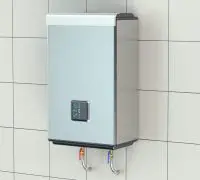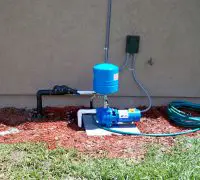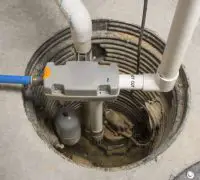Purchasing for Pollution Prevention: Specifying and Sourcing Mercury-Free HVAC and Building Equipment — PDF version.
In the past, mechanical systems used in buildings might contain pounds of mercury. While manufacturers of building equipment have made substantial progress in reducing or eliminating mercury in building system control devices, some HVAC (heating, ventilating, and air conditioning) and building equipment on the market today still contains mercury components. By asking manufacturers a few simple questions, specifiers can avoid including mercury in new building systems, where it can pose dangers during use and create disposal problems at end of life.
- Which building mechanical systems and equipment can contain mercury?
- Why should devices containing mercury be avoided?
- Are mercury-free systems readily available?
- Do mercury-free alternatives work as well?
- Are mercury-free alternatives more expensive?
- How can I specify mercury-free components?
- How can I tell if an existing system has mercury components, and how do I dispose of them during renovation or demolition?
- Where can I go for more information on removing and properly disposing of existing mercury system components?
- Table of manufacturers and vendors of mercury-free building system components
Which building mechanical systems and equipment can contain mercury?
- Heating and cooling systems may contain mercury in the switches and thermostats.
- Systems that move, store, meter, or regulate liquids, such as freshwater intake or wastewater removal systems, may contain mercury in measurement devices, valves, and flow switches.
- Older types of fire suppression and security systems relied on mercury-containing components.
Why should devices containing mercury be avoided?
Mercury is a highly persistent and toxic chemical that is building up to dangerous concentrations in fish, wildlife, and human beings throughout the US. Across the US, 45 states have issued fish consumption warnings because of elevated levels of mercury in fish.(1) In many mercury devices the mercury is contained, but glass mercury thermometers can easily break and mercury manometers (pressure gauges) can easily spill, releasing mercury to the environment. In addition, people often fail to remove mercury-containing devices from old equipment and dispose of them as hazardous waste; instead, these devices are sent to landfills, smelters, or incinerators, where they contribute to mercury contamination. A 2001 study by the New Jersey Mercury Task Force estimated that approximately 20 percent of the mercury air emissions in that state (1,000 pounds annually) originate from smelters that recycle building equipment, appliances, vehicles, and other items with mercury components.(2)
Are mercury-free systems readily available?
INFORM surveyed building equipment manufacturers to determine if mercury is common in modern systems. The survey revealed that mercury-containing components are still readily available, but that it is possible to get mercury-free components for all systems mentioned above. In fact, mercury-free alternatives now dominate the market. See the chart below for manufacturers and vendors of mercury-free components.
Do mercury-free alternatives work as well?
Mercury-free devices are available that meet or exceed the performance specifications of mercury devices. Professional rating systems and manufacturer warranties should apply to all equipment, regardless of mercury content. In fact, mercury-free electronic components often enable HVAC systems to be programmable, which can increase the energy-efficiency and versatility of the equipment.
Are mercury-free alternatives more expensive?
Mercury-free technology does not normally cost more. At least one manufacturer INFORM surveyed encourages the use of mercury-free alternatives by pricing them lower than their mercury-added counterparts.
How can I specify mercury-free components?
Anyone specifying HVAC or other building systems for new construction or renovation should specify mercury-free devices. Every manufacturer that INFORM surveyed was aware of the issues of mercury in building mechanical systems and had mercury-free alternatives readily available. There are very few applications in which mercury-added devices are the only option. Before specifying or issuing bids for building equipment, talk to manufacturers about specifications for mercury-free systems. Then include the following in your building specifications:
- No component may contain mercury, including in switches, valves, flow meters, temperature control devices, or pressure meters.
How can I tell if an existing system has mercury components, and how do I dispose of them during renovation or demolition?
When dismantling obsolete systems, be aware that some of them may contain mercury. All mercury-containing devices should be handled properly at end of life, which means delivering them for recycling or hazardous waste disposal. Any service or renovation contract should include the requirement that contractors remove mercury devices and deliver them to a third-party handler that will certify that the items will be recycled or handled as hazardous waste. Renovation or demolition contracts should specify the following:
- All mercury components of the building should be removed prior to demolition and sent to a licensed hazardous waste facility for recycling or disposal.
Where can I go for more information on removing and properly disposing of existing mercury system components?
- Mercury-Containing Products and Alternatives
- Mercury in Buildings (Tutorial)
- Construction and Demolition of Buildings With Mercury Containing Devices
- Pre-Demolition Environmental Checklist and Guide, Mercury
- Recommended Management Practices for Removing Hazardous Building Components Prior to Demolition
Manufacturers and Vendors of Mercury-Free Building System Components
| Building System or Product Type | Mercury Information | Sources of Mercury-Free Alternatives |
| Controls Airflow measurement Low water cutoffs Pump controllers Water feeders Valves Flow switches Liquid level controls Thermostats u0026amp; climate control Gas controls | Controls manufacturers generally offer both mercury-free and mercury-containing products for a wide variety of applications. It is important to check with your manufacturer’s representative about the mercury-free products for your specific application. | 1. Ebtron. Manufactures only electronic sensors that are mercury-free. (800) 232-8766; 2. Invensys (Robert Shaw). Electronic and other mercury-free alternatives are available. (815) 637-3000; 3. McDonnell u0026amp; Miller. Encourages use of mercury-free alternatives through its pricing scheme. (773) 267-1600; 4. White Rogers, a division of Emerson Climate Technologies. Mercury-free alternatives are available. Contact Emerson, (314) 553-2000; |
| HVAC Heating, ventilation, and air conditioning systems and components | Most modern systems are electronic and rely on central microprocessing units. Switches are commonly electronic or otherwise mercury-free (solid state, spring, or snap-action). It is important to note that HVAC equipment containing mercury-based switches are still manufactured. Thus, the only way to guarantee a mercury-free system is to specify that no controls or other components may contain mercury. | 1. York. Manufactures only mercury-free systems. (717) 771-7890; 2. Trane. Mercury-free systems are available upon specification. 3. Lennox. Mercury-free systems are available upon specification. (800) 4-LENNOX; |
| Boilers | Both steam and water boiler systems may contain mercury components. Mercury-free boilers are available; which systems are mercury-free varies from manufacturer to manufacturer. The components that most commonly contain mercury are pressure switches, aquastats, and float switches. | 1. Bryan Steam. Water boilers are mercury-free; mercury-free steam boilers are available. (765) 473-6651; 2. Cleaver Brooks Package Boiler Systems. Provides alternatives to mercury in both steam and water systems. (414) 359-0600; 3. ECR International (Utica Boilers). Steam boilers are mercury-free. (315) 797-1310; 4. Sussman Electric Boilers. Mercury in Sussman systems is rare but is avoidable upon specification. (800) 238-3535; www.sussmanelectricboilers.com |
| Fire Suppression | Mercury is rarely used in modern fire suppression systems. In the past, however, these systems relied heavily on mercury-based technology. | 1. Fireline Corp. Mercury-free controls. (410) 247-1422; 2. Hubbell, Inc. Some mercury-free electronic models of fire pump controls are available (LXI models), but some limited-service and diesel controls do contain mercury. Industrial Controls customer service, (336) 434-2800; 3. Metron, Inc. Mercury has been phased out of Metron’s fire pump control products. (303) 592-1903; 5. System Sensor manufactures switches for sprinkler and fire detection systems; all switches are mercury-free. (800) 736-7672; |
| Water Waste water treatment and disposal Water purification | Many systems still rely on mercury float switches and high-water alarms. However, manufacturers that sell systems with mercury-containing components can provide mercury-free alternatives upon request. | 1. Foxboro, a division of Invensys. No Foxboro products contain mercury. (866) 746-6477; 2. Norweco. Although some Norweco systems do contain mercury in float switches and alarms, it is easy to specify that the system be mercury-free. (419) 668-4471; |
| Security Intrusion and access control Some companies offer fire security systems | New transistor-based electronic systems generally eliminate the mechanical security systems that commonly contain mercury. Existing systems should be analyzed for mercury components upon demolition. | 1. Detection Systems (division of Bosch). There is no mercury in any Detection Systems products. (800) 289-0096; 2. Protection Technologies Incorporated. Products contain no mercury. (800) 428-9662; 3. Siemens. Even when a system may contain mercury, it is easy to specify mercury-free alternatives, for which there should be no price difference. (800) 560-8334; |
Notes
1 US EPA, “Update: National Listing of Fish and Wildlife Advisories,” 2003.
2 New Jersey Mercury Task Force Report, Volume III, Chapter 3, “Specific Source Descriptions,” December 2001.





